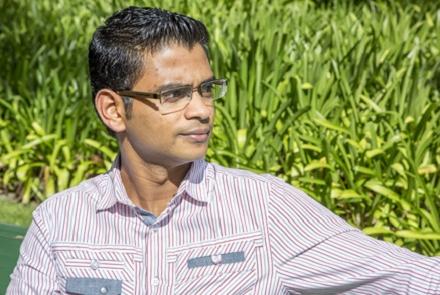
Power player
Meet Arjuna Mohottala, someone who is shining the torch on the financial costs of energy use in Asia and the Pacific with his Master of International and Development Economics.
“One of the best things about ANU is it’s not afraid to give students a try,” Arjuna Mohottala says, before giving his own story as an example.
“I was working in the IT and finance sector for about six years, before I joined the Central Bank of Sri Lanka and became an economist. It was that transition from my IT and finance background which really got me liking economics, and wanting to make a career out of it.
“I was looking to apply to one of the world’s top universities, but most of them rejected me because of my IT background. Then, I was looking through certain journal papers and publications, and I came across the name of Stephen Howes from Crawford School of Public Policy at ANU. I wrote to him directly, because he was the program manager, explaining my background and what I’ve been working on and asking about the prospects of coming to ANU. And Stephen said, ‘You’d be an ideal candidate to bring in cross-cultural and inter-disciplinary experience and we’d love to have you here.’
“Just to demonstrate how supportive the ANU College of Asia and the Pacific and Crawford School are, from my initial email to Stephen to me physically being here took less than three weeks. That gave me a really good impression of ANU and Canberra.”
If accepting Arjuna was a risk, it has more than paid off for both him and the University. He passed his graduate diploma with distinction, and is now pursuing a master’s with a view to doing a PhD at ANU, with a focus on energy economics and its impact on the financial markets of Asia and the Pacific.
But it hasn’t all been easy. Arjuna’s advice to other students coming from non-economics backgrounds is, “you need to believe in yourself”.
“When you come from a different background you need to put in a little bit more extra effort than other people. If I’m frank, sometimes learning macroeconomics, I might not have understood more than five per cent of the lecture because I hadn’t done structured macroeconomics at the undergraduate level.
“What I would do is go get undergraduate books, read them, then listen to the lecture recordings again, and try to get on par with the other students. If not, I could approach the lecturers. The good thing about is ANU is the libraries are well equipped and the faculty are very approachable. You don’t have to wait for consultation hours. Sometimes you will email them and they’ll reply in the wee hours of the morning. That has really helped me in my learning and got me to take more challenging subjects. And I’ve been loving it!”
Arjuna has also been able to make the most of his finance skills, being elected Treasurer of the ANU Postgraduate and Research Students’ Association. He says he hopes to share what he’s learnt there about student engagement with universities and organisations back in Sri Lanka.
For now, Arjuna is looking forward to more study, and even more travel.
“I always consider myself a full-time tourist and a part-time student. When I tell people how much I’ve travelled during my first year of being in Australia, they’re amazed and say, ‘How do you find the time?’ It’s not a matter of not having time, but managing your timetable properly. You devote enough time to your study, because that’s why you’re here, but you have a life to live and this country has so much to offer other than the koalas and the kangaroos. It’s good to take in those sights and sounds, because you might not come here again.”
Updated: 11 August 2024/Responsible Officer: Crawford Engagement/Page Contact: CAP Web Team













